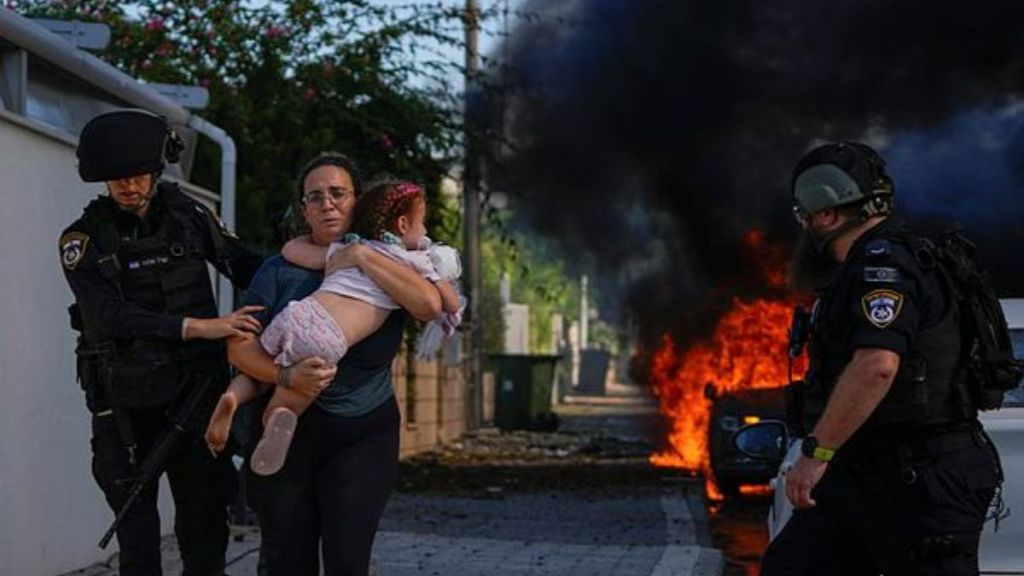By Lt Col Manoj K Channan, Veteran
Historical Background
Jews have faced persecution for millennia, with the Holocaust marking one of the darkest periods in their history. Many Jews saw the establishment of Israel in 1948 as a refuge and a homeland where they could escape the persecution that had haunted them for centuries.
However, establishing a Jewish state in what was historically Palestine led to the displacement of many Palestinians, giving birth to one of the most protracted and bitter conflicts in modern history.
Jewish and Palestinian national movements sought sovereignty over the same territory, creating a complex tapestry of historical grievances, religious significance, and competing national narratives. Given this historical context, the question arises: Is there any logic in the persecution of the Palestinians by people who were themselves persecuted?
Contemporary Challenges
The establishment of Israeli settlements in the West Bank and the blockade of Gaza are points of contention. Critics argue that such actions are inconsistent with the values of people who have been persecuted. However, defenders of Israeli policy highlight the country’s security concerns, pointing to acts of violence against Israeli civilians as justification for these measures.
The division between Hamas, which controls Gaza, and the Palestinian Authority, which has authority in parts of the West Bank, further complicates matters. Their rivalry has sometimes obstructed peace efforts and left Palestinians politically fragmented.
The Role of the UN. Over the decades, the United Nations has passed numerous resolutions to resolve the conflict. These include: –
UN General Assembly Resolution 181 (1947). This proposed the division of British Mandate Palestine into Jewish and Arab states.
UN Security Council Resolution 242 (1967). This resolution, passed after the Six-Day War, emphasized the “inadmissibility of the acquisition of territory by war” and called for Israeli withdrawal from territories occupied in the war.
Oslo Accords (1993-1995). These agreements between Israel and the Palestine Liberation Organization (PLO) set a framework for Palestinian self-governance in parts of the West Bank and Gaza.
However, a comprehensive peace agreement remains elusive despite these and other efforts.
The Persecution Paradox
The tragic irony of the Israel-Palestine conflict is that people who have faced immense suffering in their history are now associated, in the eyes of some, with the suffering of other people. It is essential to remember that the actions of a government do not necessarily reflect the views or desires of its entire population. Many Israelis and Jews worldwide are deeply troubled by the plight of the Palestinians and advocate for their rights.
On the other hand, the Israeli government, having the primary duty to ensure the safety of its citizens, often justifies its policies in the occupied territories as necessary for security. The repeated wars, intifadas (uprisings), and acts of terrorism have deepened mistrust, often making security concerns eclipse other considerations.
Towards a Path of Peace
While the road to peace seems challenging, focusing on shared human values and mutual respect is essential. Grassroots initiatives, where ordinary Israelis and Palestinians come together to understand each other’s narratives, can play a pivotal role.
Conclusion
People often express sorrow over the death of children, even if they are from an opposing side. However, when one’s supported side commits atrocities, many defend such acts by citing similar deeds of the opponent, creating justifications from various areas like theology to history. By staunchly backing violence by one group against another, we risk promoting community violence, intentionally or inadvertently. While we might advocate for a side’s right to inflict harm, confronting the lifeless face of a child victim becomes daunting, fearing they might ask the haunting question, “tell me why?”.
The Israel-Palestine conflict embodies the tragic cycle of history where the persecuted can become the persecutor. However, it is a simplification to paint any side with a broad brush. The path to peace lies in understanding the complexities and working towards a future where Israelis and Palestinians can live in dignity and harmony.
The author is an Indian Army Veteran.
Disclaimer: Views expressed are personal and do not reflect the official position or policy of Financial Express Online. Reproducing this content without permission is prohibited.


